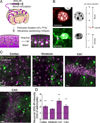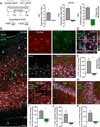Direct neuronal glucose uptake heralds activity-dependent increases in cerebral metabolism
- PMID: 25904018
- PMCID: PMC4410436
- DOI: 10.1038/ncomms7807
Direct neuronal glucose uptake heralds activity-dependent increases in cerebral metabolism
Abstract
Metabolically, the brain is a highly active organ that relies almost exclusively on glucose as its energy source. According to the astrocyte-to-neuron lactate shuttle hypothesis, glucose is taken up by astrocytes and converted to lactate, which is then oxidized by neurons. Here we show, using two-photon imaging of a near-infrared 2-deoxyglucose analogue (2DG-IR), that glucose is taken up preferentially by neurons in awake behaving mice. Anaesthesia suppressed neuronal 2DG-IR uptake and sensory stimulation was associated with a sharp increase in neuronal, but not astrocytic, 2DG-IR uptake. Moreover, hexokinase, which catalyses the first enzymatic steps in glycolysis, was highly enriched in neurons compared with astrocytes, in mouse as well as in human cortex. These observations suggest that brain activity and neuronal glucose metabolism are directly linked, and identify the neuron as the principal locus of glucose uptake as visualized by functional brain imaging.
Figures








References
-
- Dienel GA, Hertz L. Glucose and lactate metabolism during brain activation. Journal of neuroscience research. 2001;66:824–838. - PubMed
-
- Hertz L, Dienel GA. Energy metabolism in the brain. International review of neurobiology. 2002;51:1–102. - PubMed
-
- Pellerin L, et al. Evidence supporting the existence of an activity-dependent astrocyte-neuron lactate shuttle. Developmental neuroscience. 1998;20:291–299. - PubMed
-
- Magistretti PJ, Pellerin L, Rothman DL, Shulman RG. Energy on demand. Science. 1999;283:496–497. - PubMed
-
- Pellerin L, Magistretti PJ. Food for thought: challenging the dogmas. Journal of cerebral blood flow and metabolism : official journal of the International Society of Cerebral Blood Flow and Metabolism. 2003;23:1282–1286. - PubMed
Publication types
MeSH terms
Substances
Grants and funding
LinkOut - more resources
Full Text Sources
Other Literature Sources
Molecular Biology Databases

